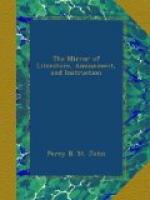At the battle of Agincourt, gained by Henry V. the French lost ten thousand men, and fourteen thousand prisoners; the English (although enfeebled by disease, destitute of provisions, and harassed by fatigue) lost only forty men in all—Ibid.—Hear these facts of ancient prowess, ye heroes of modern times; who among ye ever gained such signal advantages with losses so insignificant?—In good truth, I must admit, that even I was once inclined to cry out with Mr. Burchell, “fudge;” but the following morceaux have explained to me the (otherwise) mysterious relation:—
One Englishman can beat five Frenchmen.—Williamson’s Serious Propositions, page 78.—One English man-of-war, will beat a Dutch fleet—Nebolt’s Naval Expeditions, chap. iv. section 9.—Indeed! what a scandalous shame it is then to call Admiral Blake a naval hero; surely he could have been but a mere botch to make such a tough job of cutting up Van Tromp, the Dutch commander.
* * * * *
Though I have examined what all other authors have written on this affair with great impartiality, yet I cannot conceive that any of them have the least merit; nor do I find one man that has treated this subject sensibly, besides myself.—Smithson’s Amiableness of Candour and Diffidence, page 8.—What modesty! what candour! amiable critic! doubtless your ingenuous style has obtained you a place on the shelves of the literati; and like Ovid and Horace you have secured as well as assigned yourself an immortality.
* * * * *
SELECT BIOGRAPHY.
* * * * *
MEMOIR OF BOLIVAR.
The conspicuous part which Bolivar has acted throughout the revolution in Colombia, and at the close of that in Peru, renders it imperative on us to give some account of a character, identified with so many great and extraordinary events.
Simon Bolivar was born at Caracas on the 25th of July, 1783. He lost his parents at an early age; and, in his sixteenth year, was sent to Europe to finish his education. He made the tour of France and Italy. Having married at Madrid, he embarked for Venezuela, where his wife died a few months after her arrival. Bolivar went a second time to Europe, and was present at the coronation of Napoleon. He returned to Caracas in company with Emparan, appointed captain-general of Venezuela by the central junta at Seville. Soon after the raising of the standard of independence (19th April, 1810) in that country, he was sent to solicit the protection of Great Britain. He was well received by the Marquess Wellesley, then secretary for Foreign Affairs. The British government offered its mediation between Spain and her colonies, but the offer was rejected by the court of Madrid. Bolivar returned to his own country, accompanied by General Miranda, who was placed in command of the Venezuelan troops. But the revolutionary government was too feebly organized to give efficiency to the military force. Divisions arose, and the cause of independence was on the retrograde, when the dreadful earthquake of 1812, and the subsequent invasion by the Spanish force under General Monteverde, for the time, precluded all possibility of success.




